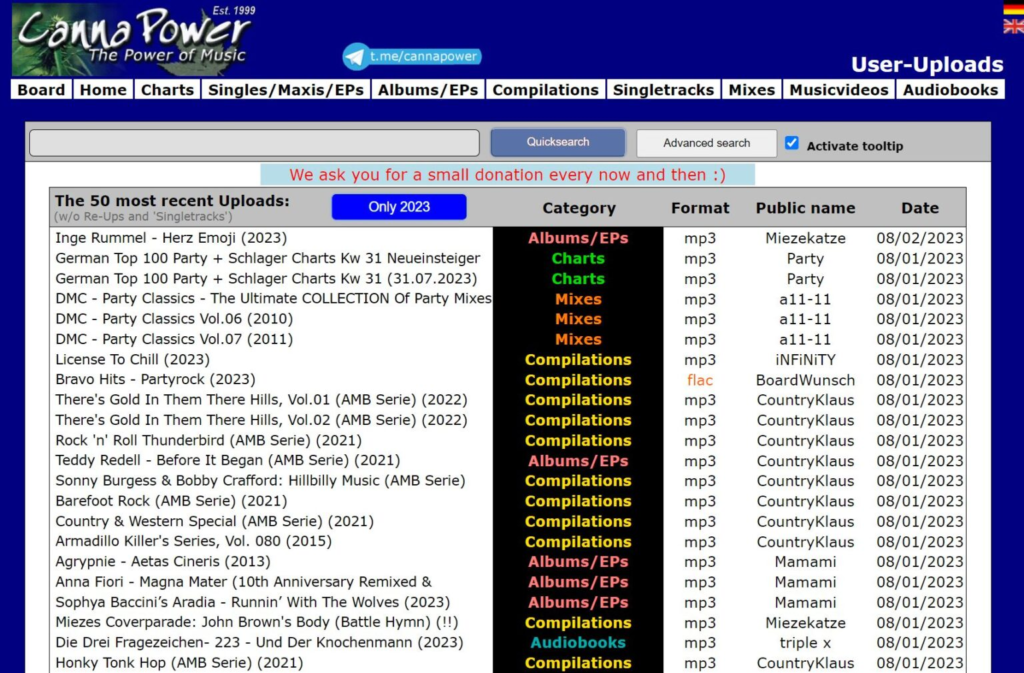Sony Music’s successful legal efforts in obtaining a German blocking order against the music piracy site CannaPower represent a significant milestone in the ongoing battle against online piracy. By compelling DNS provider Quad9 to block global access to the site, Sony Music aims to disrupt its operations and mitigate copyright infringement.
However, the operator of CannaPower appears undeterred by the blocking measures, expressing defiance and asserting that the action has had minimal impact on site traffic. This response underscores the challenges in effectively combating online piracy, as site operators often employ various strategies to evade enforcement efforts and maintain their illicit activities.

In response to the blocking order, the operator mentions the possibility of migrating to the Tor network, a decentralized and anonymous network that can provide a degree of protection against censorship and surveillance. This highlights the cat-and-mouse nature of anti-piracy efforts, as enforcement actions may prompt site operators to seek alternative means of maintaining their operations.
While legal measures such as blocking orders can serve as valuable tools in combating piracy, their effectiveness may be limited by the resilience and adaptability of piracy sites and their operators. As the battle against online piracy continues, stakeholders must remain vigilant and explore innovative strategies to protect intellectual property rights in the digital age.
CannaPower’s resilience in the face of blocking efforts highlights the challenges faced by rightsholders in combating online piracy. Despite being targeted by blocking measures in Germany and globally through DNS resolver Quad9, the site continues to operate and maintain its user base.
The ability of users to circumvent DNS blocking by switching to alternative DNS resolvers underscores the limitations of such enforcement measures. While blocking orders may impede access for some users, determined individuals can often find ways to bypass these restrictions, such as utilizing different DNS resolvers or accessing the site through the Tor network.
CannaPower’s defiance in response to the blocking efforts reflects a common sentiment among many piracy site operators who are accustomed to facing legal challenges from rightsholders. As long as there is demand for pirated content and avenues for accessing it, these sites may persist despite enforcement actions.
Moving to the Tor network presents another challenge for rightsholders, as it provides a decentralized and anonymized platform that can make it more difficult to track and block access to illicit sites. While the Tor network offers increased privacy and censorship resistance, it also presents technical hurdles for mainstream users, potentially limiting the reach of piracy sites operating within it.
Overall, the ongoing battle between rightsholders and online piracy sites underscores the need for comprehensive and multifaceted approaches to tackling copyright infringement in the digital age. This includes not only legal enforcement measures but also efforts to promote legal alternatives, educate consumers about the harms of piracy, and collaborate with internet service providers and technology companies to combat illicit activities.

CannaPower’s revelation that it was unaware of Quad9’s global blocking efforts underscores the ongoing cat-and-mouse game between pirate sites and rightsholders. Despite the efforts of copyright holders to disrupt access to these platforms, site operators often find ways to adapt and continue their operations.
The site’s decision to remain operational from its current domain, canna-power.to, suggests that it views the blocking measures as a temporary setback rather than a significant obstacle. However, the plan to switch to a new domain in the future indicates a recognition of the need to stay ahead of enforcement efforts and maintain accessibility for users.
The assertion that revenue is not a primary concern for CannaPower’s operator reinforces the notion that some pirate sites are driven more by ideology or personal interest than financial gain. While reduced traffic and donations may impact the site’s sustainability to some extent, the operator’s willingness to finance the project out of their own pocket indicates a level of commitment that may outweigh monetary considerations.
Ultimately, the resilience of sites like CannaPower highlights the challenges faced by rightsholders in combatting online piracy. As long as there is demand for pirated content and individuals willing to operate and support these platforms, the battle against copyright infringement will continue.






